Others see her as a child with Down Syndrome, but her family sees her as the Joy of the Lord
On World Down Syndrome Day (March 21), Salt&Light recognises the fortitude of families who keep the faith as they live with Down Syndrome.
by Christine Leow // March 21, 2024, 12:52 am

Rev Koh Hock Soon, Joel, Yen Ting and Joy at Joel's graduation from the National University of Singapore. Although the news of Joy's condition was difficult for them to accept in the beginning, they can see God's hand in her life and are thankful for the joy she brings to everyone around her. All photos courtesy of the Kohs.
Joy Koh loves to sit in quiet reflection, recording her thoughts in her diary. She is also an artist who enjoys working with acrylic, poster paint and colour pencils.
“She’s cute. To those she is close to, she dares to be quite expressive of her emotions. She can be quite talkative,” said her father, Rev Koh Hock Soon, vicar of St Matthew’s Church.
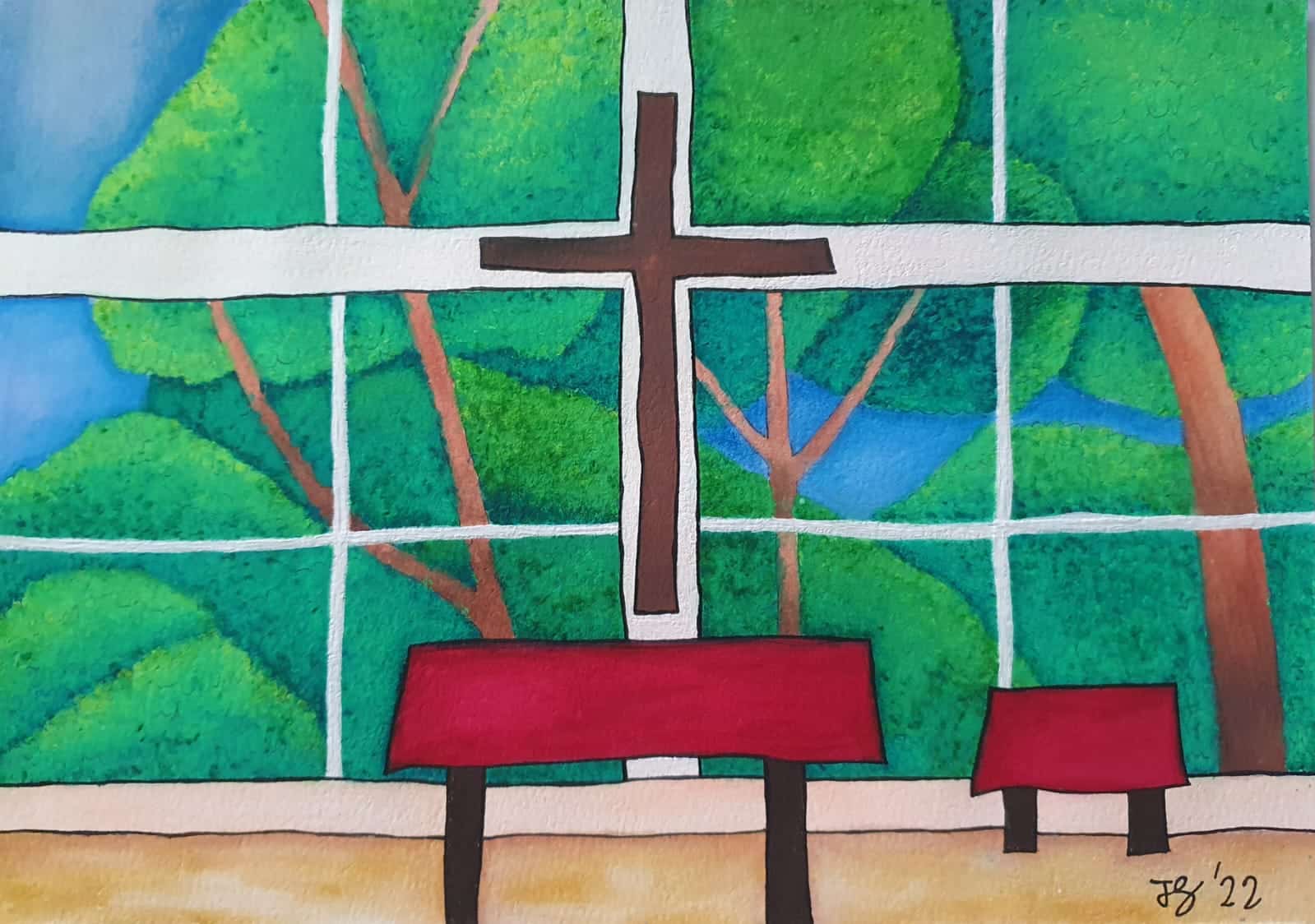
Joy’s painting of St Matthew’s Church which she gifted to the church.
Added her mother Yen Ting: “Like all the young people, she wants to be independent, likes to do things for herself. She likes her own personal space.”
A natural at languages, Joy picked up traditional Mandarin by watching Taiwanese drama serials.
“Sometimes she even comes up with Chinese proverbs that her mother doesn’t even know,” said Rev Koh.
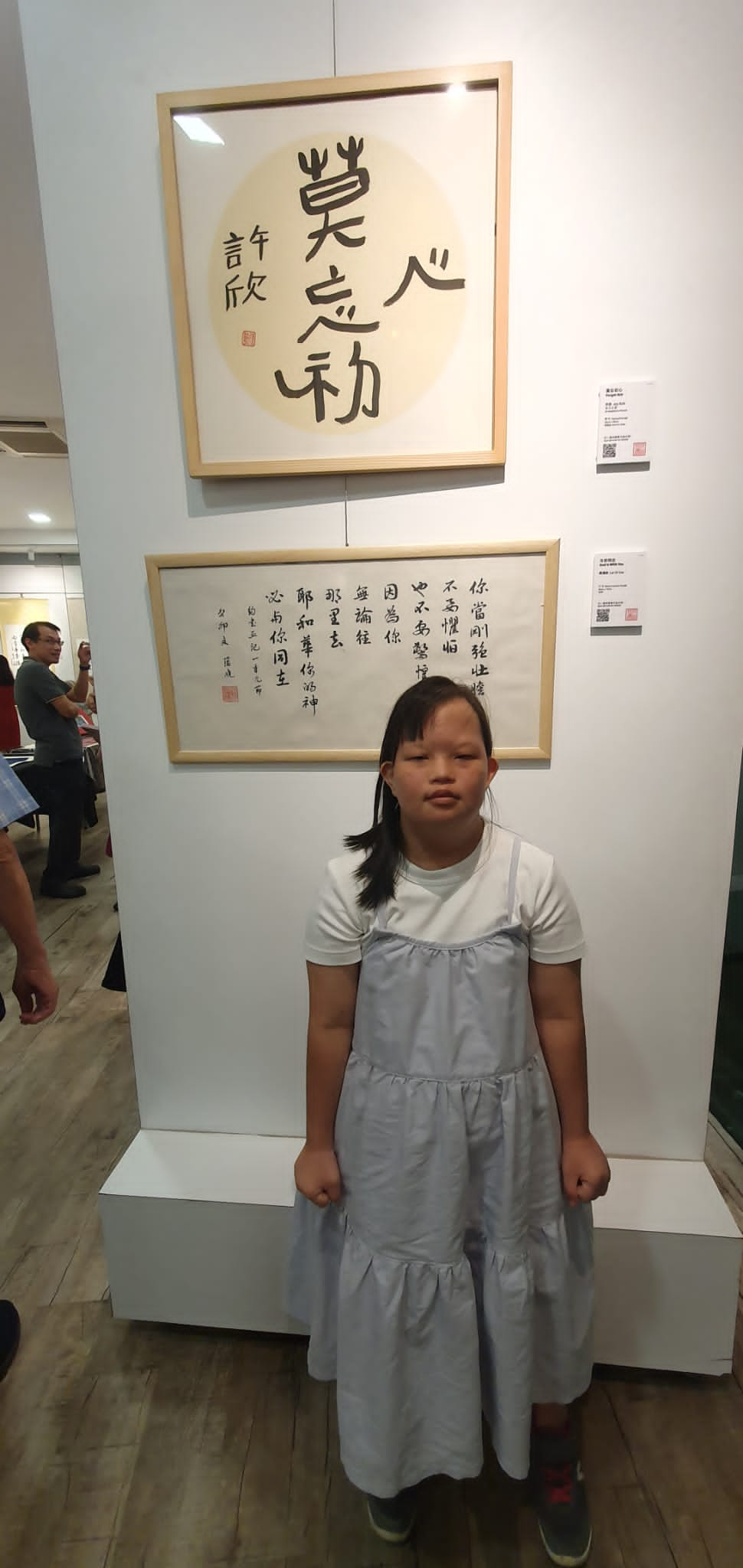
Joy at the Colours of the Bible exhibition by the Bible Society of Singapore in conjunction with the Bible and Chinese Culture Festival. Her calligraphy 莫忘初心‘ was featured in the exhibition.
When Joy messages her father, she uses traditional Mandarin, her mother told Salt&Light.
“She’s cute. To those she is close to, she dares to be quite expressive of her emotions.”
But while her peers at 21 years of age may be in university or working, Joy is on the waitlist to go to MINDS (Movement for the Intellectually Disabled of Singapore) for vocational training. The voluntary welfare organisation offers services for the intellectually disabled.
Joy was born with Down Syndrome, a genetic condition where a person has an extra copy of chromosome 21 and ends up with 47 chromosomes instead of 46. The chromosomal disorder can result in intellectual disability and developmental delays as well as poorer muscle tone.
Nothing prepared the Kohs for the fact that their second child would be born with this condition. Their son, born four years earlier, was perfectly healthy.
“I asked God, ‘Why me?’” admitted Yen Ting.
The initial shock
Yen Ting’s second pregnancy was not as smooth as her first. But it was not particularly difficult either. The only issue was her baby’s weight.
“Don’t give me a child with Down Syndrome because that is my threshold.”
“The doctor did say that the baby wasn’t growing that well. She said that we could maybe induce the baby earlier so that, if the baby was not growing well inside, she would grow better outside.”
Yen Ting thinks there was also some miscommunication at the clinic because, unlike her first pregnancy, she never went through a detailed ultrasound to check for anomalies.
During her second pregnancy, she would often have lunch at her mother’s house because it was near her workplace. Each time she was there, she would see a van ferrying children with special needs.
“I’m a person who tends to worry. I remember I prayed to God, ‘You said that You will not give us a burden that is too difficult for us to bear. So don’t give me a child with Down Syndrome because that is my threshold.’”
Because her baby was born by Ceasarean-section. Yen Ting did not get to see her immediately. She was only told the next day that Joy had Down Syndrome.
“I told God, ‘I thought I told You this is my threshold? Why would You give someone like that to me?’” recalled Yen Ting.
“I also blamed myself: Did I do something during the pregnancy? Did I not take care of myself well enough?”
“What was important was that we have a God who is willing to go through our suffering with us.”
Rev Koh received the news about his new daughter from his wife. He was about to go to the hospital to see mother and child when she called him.
“On the way to the hospital, I struggled with the news. But by the time I reached the hospital, I had accepted the fact. I was just concerned about how to cope with the baby.”
Yen Ting is grateful her husband held steady.
“Imagine if the two of us were crying! So while I blamed myself, he never once blamed me. He never asked God ‘why?’ like I did.”
Explained Rev Koh: “Before Joy was born, I was reading and thinking about the question: Why would a good God let man suffer? For a pastor, we explore these various questions.
“But once I was in the situation myself, I didn’t feel the need to have this question answered. What I needed most was to know how to go through the suffering. And what was important to us was that we have a God who is willing to go through our suffering with us. Everything is in His hands.”
The road to acceptance
Because Joy weighed less than 2kg at birth, she was placed in the neonatal ICU. So Yen Ting did not yet get to see her new baby. She was quite apprehensive about that first meeting.
“The busy-ness of things helped me not to overthink things.”
“But my husband brought a friend to visit Joy and the friend said that she looked okay. His description gave me the courage to go to the NICU because I thought, ‘I’m her mum. I must go and see her.’”
Babies with Down Syndrome have poor muscle tone. So Joy did not have the strength to suck and needed feeding tubes. She also had tubes to help her breathe. No one had told Yen Ting about all this.
“When I saw her, she was so small. She was also not as pinkish as other babies and she had rashes. I got a shock.”
Although Joy was moved to a normal ward within a week, she had to remain in the hospital because she had trouble sucking.
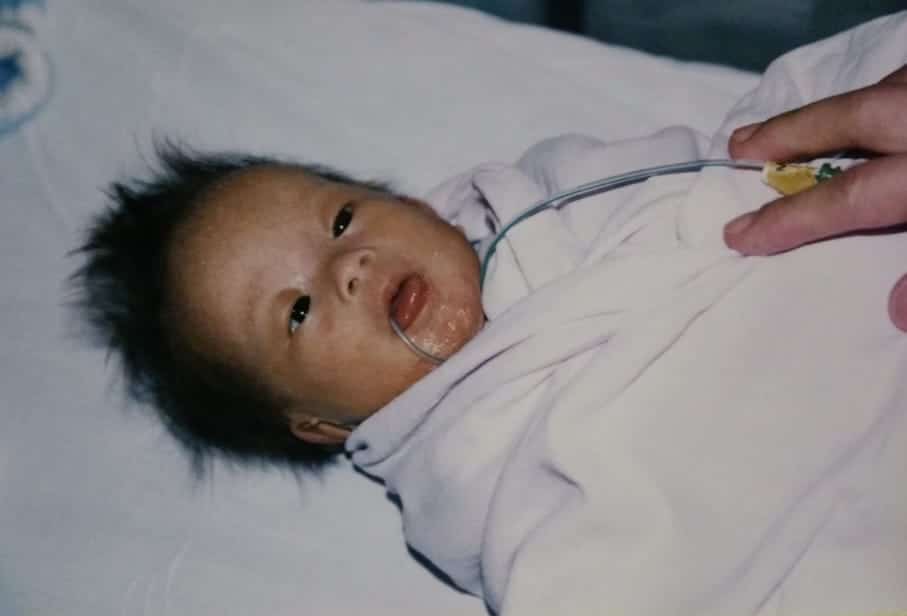
Baby Joy with a feeding tube in the hospital.
She relied on feeding tubes and was only discharged two months later when she could finish a bottle of milk.
“If she was emotional, I let her be emotional. I took each step at a time.”
That meant that the Kohs had to shuttle between home and hospital daily to see their baby and deliver her breast milk. Expressing milk every few hours while caring for a pre-schooler and visiting her new baby was a challenge for Yen Ting. But there was a silver lining.
“The busy-ness of things helped me not to overthink things,” she admitted.
It took Yen Ting more than six months to process her grief.
Said Rev Koh, who was a theological student at the time preparing to be an Anglican minister: “I supported her. If she cried, I let her cry. If she was emotional, I let her be emotional. I took each step at a time.”
It was only when Yen Ting saw other families who also had a son and a daughter, and could feel happy for them, that she realised she had accepted her situation.
Raising Joy
Children with the extra copy of chromosome 21 woven into their DNA are at risk for many things. Besides being tinier than their peers, they face the possibility of other health issues such as hearing loss, ear infections, eye diseases like cataracts and heart defects.
Mental and speech development delays are also common.
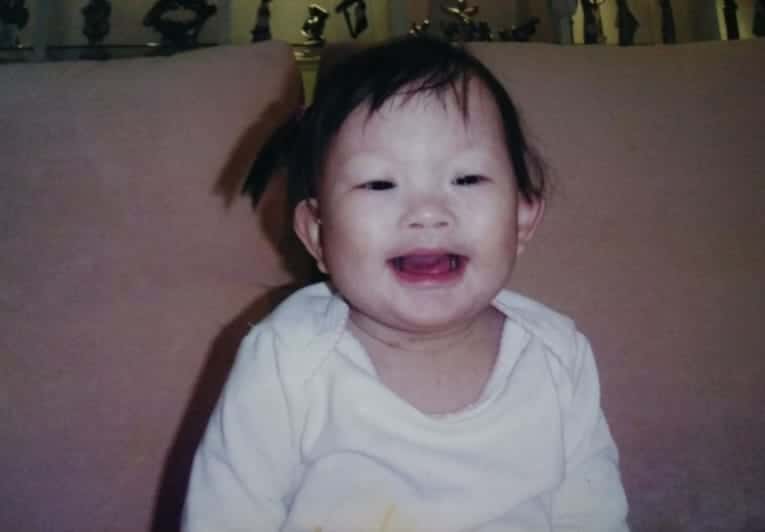
Joy at 11 months.
Joy’s parents say that apart from mild hearing loss, she is fine in every other aspect.
Added Yen Ting: “When we eventually brought her home and I was feeding her and talking to her, I suddenly had this thought: Where is this extra chromosome that is in her?
“I felt she was like any other ordinary baby. When I talked to her, she laughed and she smiled. When she was hungry, she cried. She played with her kor kor (older brother). She’s like your typical child.”
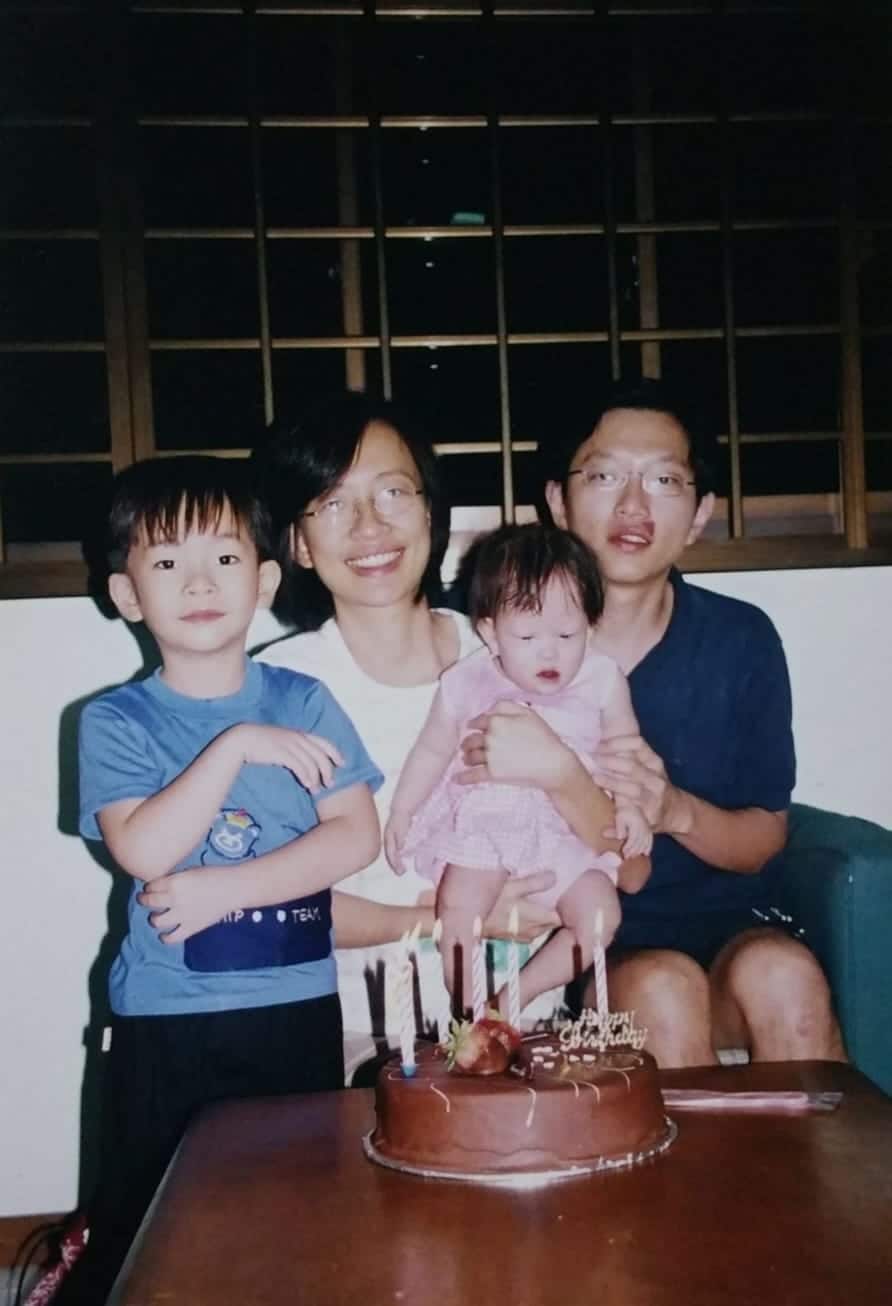
The family celebrating Joy’s first birthday.
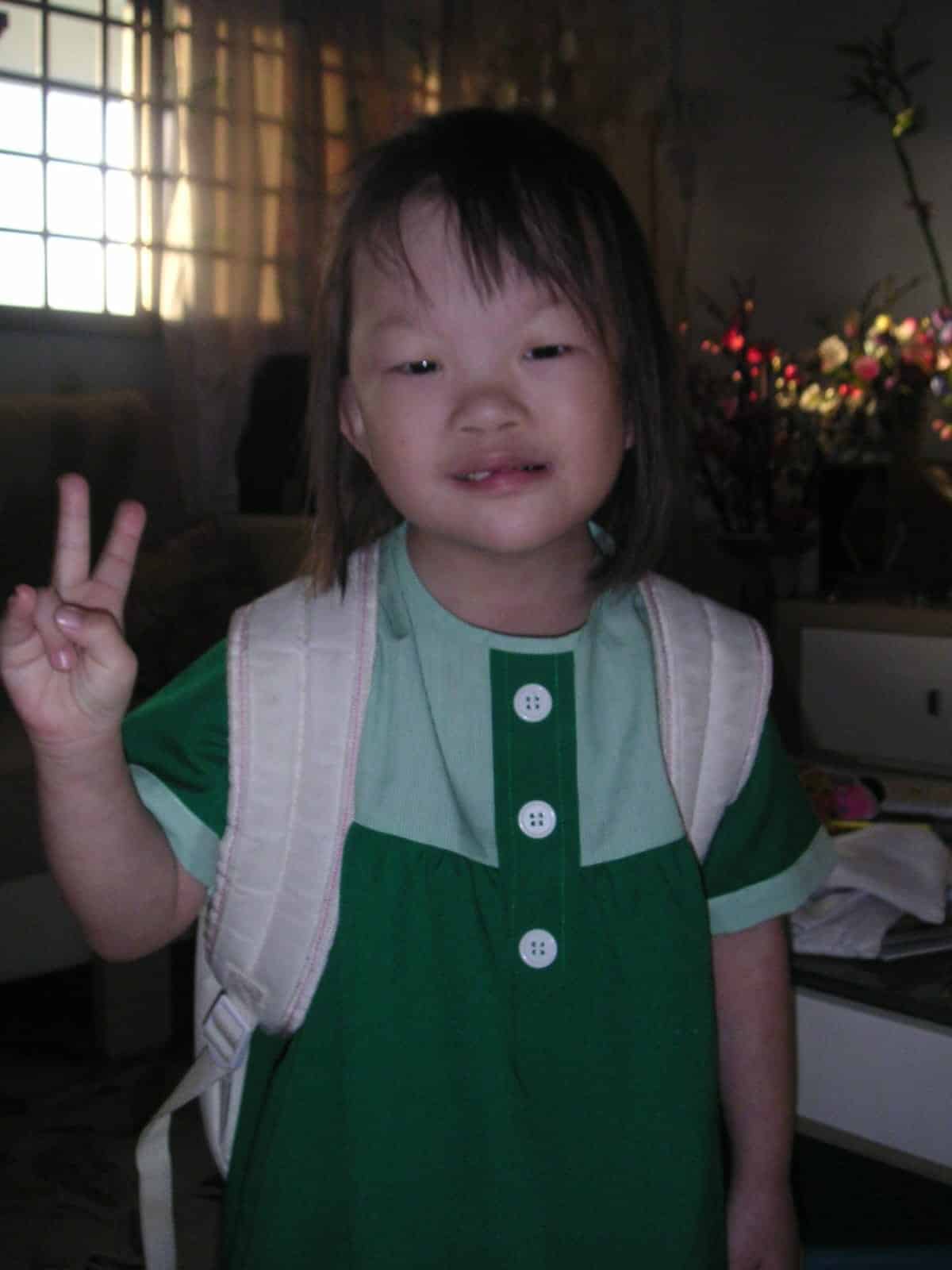
Joy in preschool.
The Kohs did decide to place Joy in a special school instead of a mainstream one.
“I wanted something that is different for her. I wanted her to enjoy going to school and to enjoy learning for the knowledge, and not to be so stressed over tests and exams and things like that. I have no regrets about the decision,” said Yen Ting.

Joy enjoyed her years in a school for children with special needs.
The Kohs have explained to Joy her condition.
“I felt she was like any other ordinary baby.”
“She doesn’t consider herself different from others. I don’t tell her she is like other children or that she is different.
“Instead, I tell her, ‘This is your potential. You are good at this while others are good at other things. That’s what makes us different from each other.’”
Her older brother is a role model of sorts to Joy. As children, they were very close.
Said Yen Ting: “They would shield each other. If I scolded the brother, she would say, ‘Don’t scold kor kor.’ If I scolded her, her brother would say, ‘Don’t scold her, scold me instead.’”
Joy hopes to go to work one day like her brother and contribute to the family.
“Why me again, Lord?”
But when Joy was about 12, the Kohs received more bad news.
Joy had developed a fever. But even after she recovered, the family discovered that she could not raise her left hand. So they took her to the doctor and was told that Joy had had a stroke.
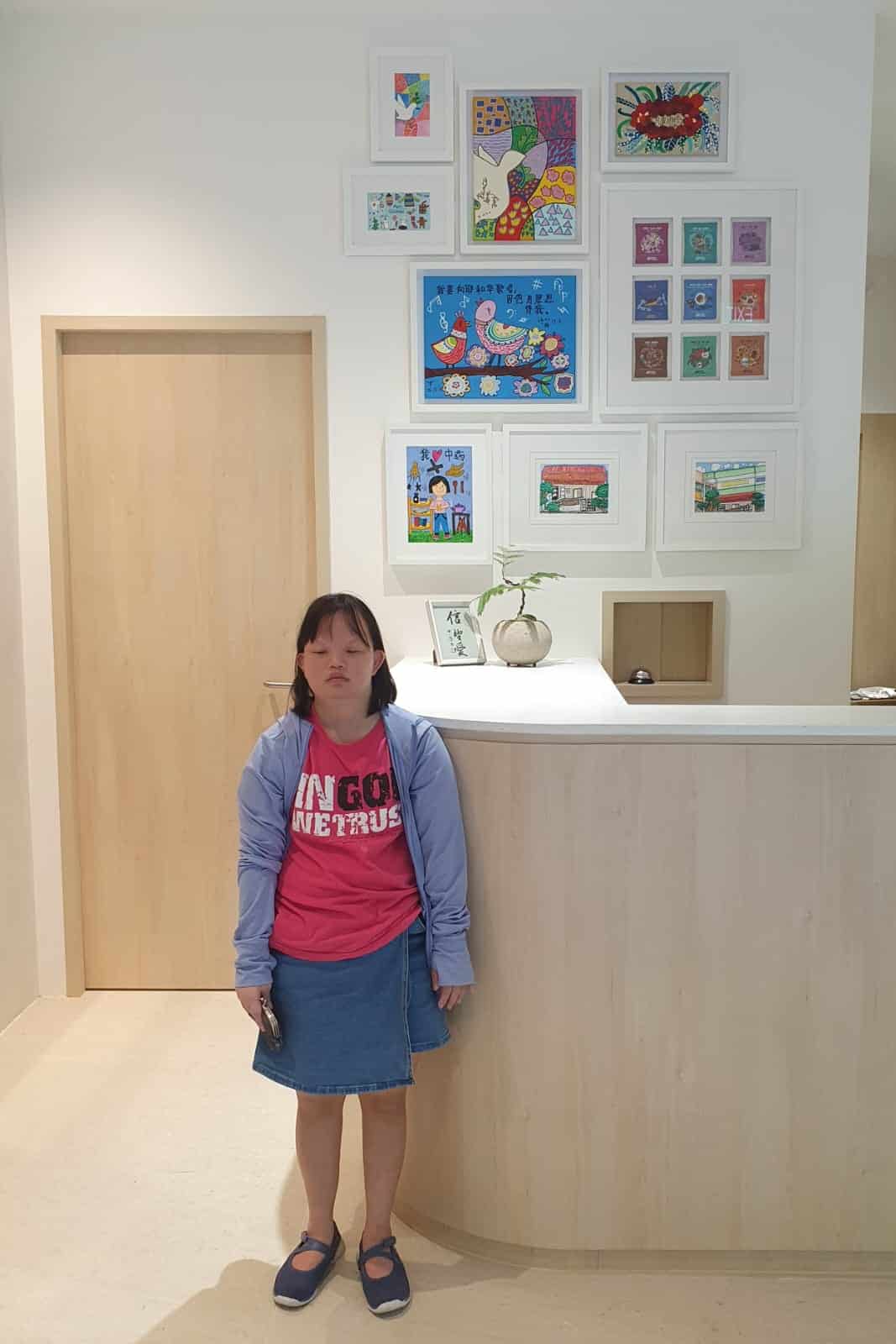
Joy at the TCM clinic where she goes for monthly treatment. She has been gifting some of her artwork to her doctor who displays the works in his clinic.
The cause was a rare disease called Moyamoya. Moyamoya is a condition where blood vessels that supply blood to the brain become narrowed. This limits blood flow to the brain, increasing the risk of a stroke.
“When we found out, I asked God, ‘Why me again?’” said Yen Ting.
“As long as she lives a happy and fruitful life, we will try our best to be there for her.”
Joy had to undergo surgery to restore blood flow to the right side of her brain. At the time, Rev Koh had just been posted to St Matthew’s Church from another church. After preaching his first sermon there, he told the leadership that he had to be with his daughter who was due for an operation.
“That was the challenge – taking care of Joy, taking care of the family and pastoring the church. But I am glad I came to St Matthew’s not as person with no life challenges but as a person like any other, with life struggles and family commitments.
“When I broke the news to my members and leaders, they came forward to pray for me. Taking each step at a time was how I went through that difficult period.”
People with Down Syndrome also tend to have a shorter life expectancy. The doctors had told the Kohs about this the moment Joy was diagnosed.
“I find it quite ironic to talk about a person’s departure as soon as she is just born,” said Rev Koh.
The Kohs have chosen to concentrate on the life Joy has.
“We treat today as the first, the last and the only day,” said Rev Koh.
Added Yen Ting: “As long as she lives a happy and fruitful life, whether it is long or 40 plus years, we as parents try our best to be there for her.”
Joy and faith
To that end, the Kohs have imparted their Christian faith to Joy. From young, she attended Sunday School.
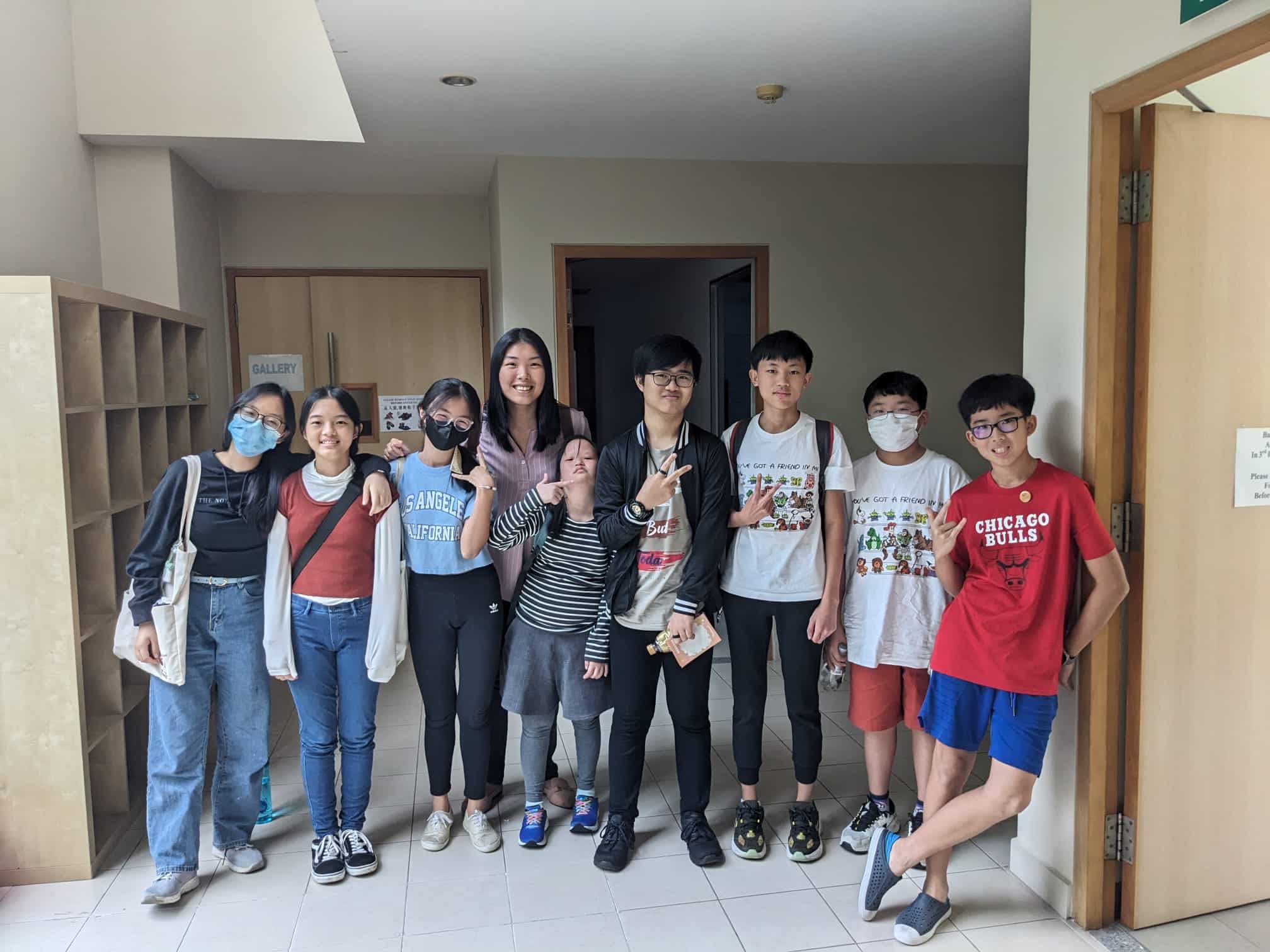
Joy (centre) with her Sunday School class and her favourite Sunday School teacher (in pink).
“I did think about her faith, whether she knows God. I did wonder if things like that may be a bit difficult for her to understand,” said Yen Ting.
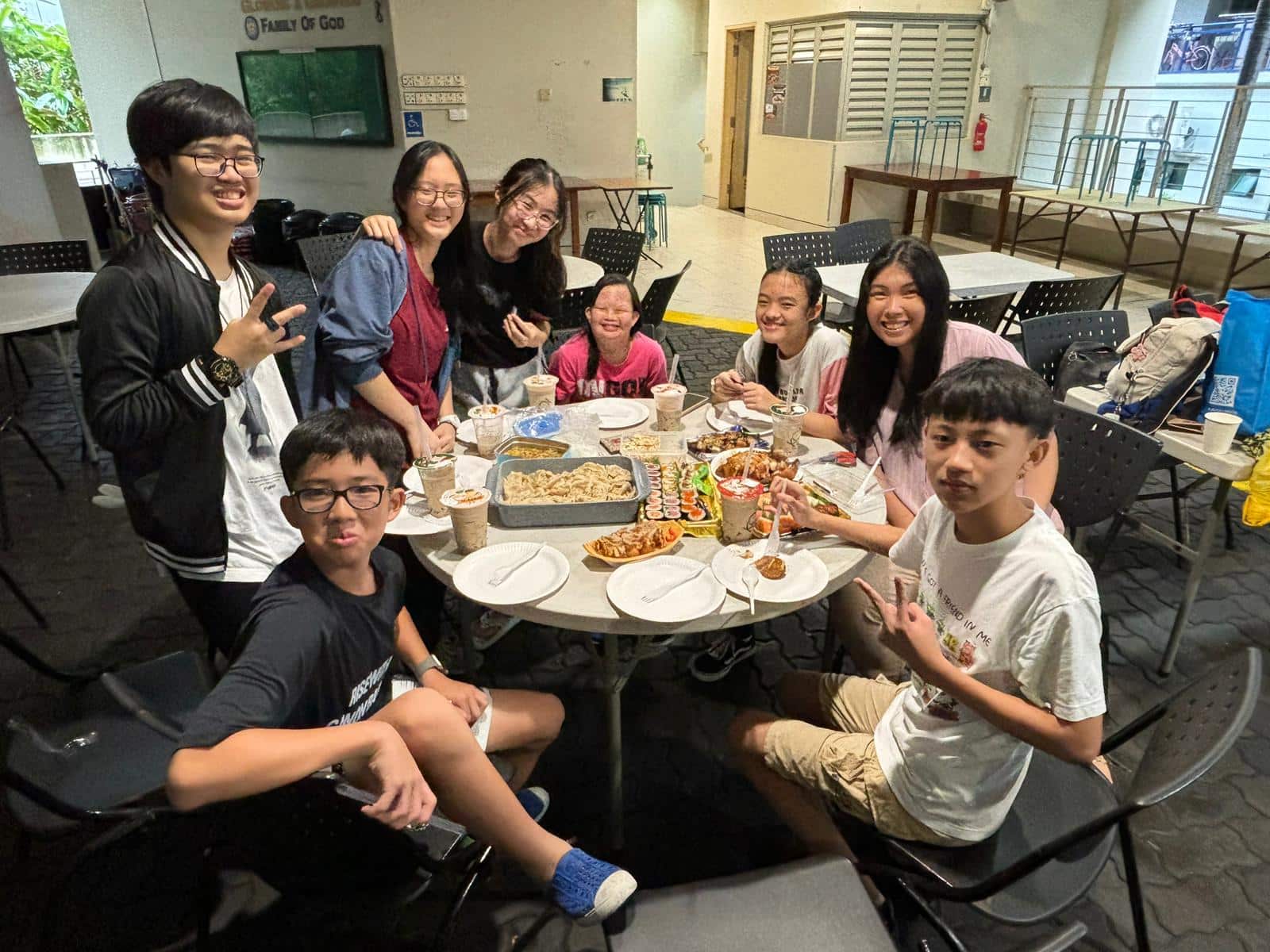
Joy (centre) celebrating her birthday with church friends.
When Joy experienced challenges during her recent nine-month internship, she told her parents that she would hide in the bathroom to ask God for strength to carry on. When she felt down, she listened to Christian songs.
“It surprised me and I realised that she had spiritually grown up quite a lot,” said Yen Ting.
Last year when Joy found out that the church was running an Alpha course, she asked to be included.
“Looking at her reminds me that we are God’s beloved regardless of our condition.”
“But she was shy. So during the discussions, she texted me her answers and asked me to read them out loud for her,” said Rev Koh.
The Kohs have found other reasons to be thankful for their journey. When two fellow clergymen had babies with Down Syndrome a few years after Joy came along, the Kohs were able to share their experiences and be a source of comfort. Today, the three families are good friends.
Joy’s story has also been a comfort in other ways. Rev Koh had written about their journey for a church newsletter. A member of his congregation used that testimony to encourage her daughter who lost her baby son shortly after he was born.
“It gave her a lot of comfort. Slowly she walked out of her depression,” said Rev Koh.
“Her name is Joy and she really brings us joy. Looking at her reminds me that we are God’s beloved regardless of our condition.”
RELATED STORIES:
“Disabled does not mean unable”: 10 persons with special needs ascend Mount Fuji
“Disabled does not mean unable”: 10 persons with special needs ascend Mount Fuji
We are an independent, non-profit organisation that relies on the generosity of our readers, such as yourself, to continue serving the kingdom. Every dollar donated goes directly back into our editorial coverage.
Would you consider partnering with us in our kingdom work by supporting us financially, either as a one-off donation, or a recurring pledge?
Support Salt&Light


